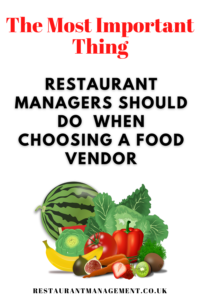Restaurant Food Vendor Selection
In the dynamic and competitive world of the restaurant industry, selecting the right restaurant food vendor is a crucial decision that can significantly impact the success and operations of a restaurant. The relationship between a restaurant and its food vendor goes beyond a mere transactional exchange. It is a partnership built on trust, reliability, quality, and shared values. Restaurant managers and owners must carefully evaluate various factors when choosing a restaurant food vendor to ensure they make an informed decision that aligns with their business goals.
Reliability and Consistency: The Foundation of Success
When considering a restaurant food vendor selection, reliability and consistency should be the cornerstone of your decision-making process. A dependable restaurant food vendor will ensure a steady supply of fresh and high-quality ingredients, eliminating the risk of running out of essential items during peak hours. By consistently delivering on time, restaurant managers can maintain smooth operations, prevent customer dissatisfaction, and uphold their reputation for reliability.

Quality and Freshness: The Key to Culinary Excellence
One of the most critical factors that restaurant managers should prioritize when choosing a restaurant food vendor is the quality and freshness of the ingredients provided. High-quality ingredients directly contribute to the taste, presentation, and overall culinary experience offered by the restaurant. Partnering with a restaurant food vendor that shares your commitment to excellence will help you create delectable dishes that leave a lasting impression on your customers.
- Menu Diversity and Customization: Catering to Every Palate
In today’s diverse culinary landscape, restaurants must cater to a wide range of dietary preferences and restrictions. A reputable restaurant food vendor should offer an extensive selection of products that can accommodate different cuisines, dietary needs, and trending food preferences. The ability to customize orders and source unique ingredients empowers restaurant managers to create menus that captivate their target audience and set their establishment apart from competitors.
- Cost-Effectiveness: Maximizing Profitability
While quality and reliability are paramount, restaurant managers must also consider the cost-effectiveness of partnering with a restaurant food vendor. Striking the right balance between quality and affordability is crucial to maintaining profitability. A cost-effective restaurant food vendor can provide competitive pricing without compromising on the quality of the ingredients. By optimizing costs, restaurant managers can allocate resources to other aspects of their business, such as marketing and staff development.
- Food Safety and Compliance: Ensuring Customer Well-being
Safeguarding the health and well-being of customers is a top priority for any restaurant. When choosing a food vendor, managers must prioritize those who adhere to strict food safety standards and comply with local regulations. Regular inspections, proper handling, and storage practices, as well as transparent traceability systems, are indicators of a food vendor’s commitment to food safety. By partnering with a vendor that prioritizes these aspects, restaurant managers can instil confidence in their customers and protect their reputation.

Environmental Responsibility: Promoting Sustainability
As the world becomes more environmentally conscious, consumers increasingly seek out restaurants that prioritize sustainable practices. Restaurant managers should consider partnering with food vendors who share their commitment to environmental responsibility. This includes sourcing ingredients from local and organic suppliers, reducing packaging waste, and implementing sustainable practices throughout the supply chain. Demonstrating a dedication to sustainability not only aligns with consumer preferences but also positions the restaurant as a responsible corporate citizen.
Exceptional Customer Service: Building a Lasting Relationship
The relationship between a restaurant and its food vendor extends beyond the products exchanged. Exceptional customer service plays a pivotal role in establishing a strong and enduring partnership. A good restaurant food vendor selection provides responsive and personalized support, promptly addresses of any concerns, and offers flexibility in meeting the restaurant’s evolving needs becomes a valuable ally in the restaurant’s success. Building a collaborative relationship based on effective communication and mutual respect creates a foundation for long-term growth.

Types Of Suppliers In The UK Food Industry
In the UK food industry, various types of suppliers play essential roles in the supply chain. Here are some common types of suppliers:
Wholesale Food Suppliers: Wholesale suppliers provide a wide range of food products, ingredients, and beverages to businesses, including restaurants, cafes, and catering companies. They often offer bulk quantities at competitive prices, catering to the needs of foodservice establishments.
Farmers and Growers: Farmers and growers play a vital role in the food industry by cultivating and harvesting a variety of agricultural products. They supply fresh produce, such as fruits, vegetables, grains, and herbs, directly to restaurants or through distributors.
Specialty and Artisanal Suppliers: Specialty and artisanal suppliers focus on unique and high-quality products that cater to specific culinary preferences. They may specialize in providing gourmet ingredients, artisanal cheeses, specialty meats, organic produce, or locally sourced products.
Meat and Seafood Suppliers: Meat and seafood suppliers specialize in providing a wide range of meat and seafood products to the food industry. They source and distribute fresh and frozen meat cuts, poultry, fish, and seafood, ensuring quality and compliance with industry standards.
Bakery and Pastry Suppliers: Bakery and pastry suppliers offer a variety of baked goods, pastries, bread, and related ingredients to restaurants, cafes, and bakeries. They may supply ready-made baked goods or provide ingredients for in-house baking.
Dairy and Cheese Suppliers: Dairy and cheese suppliers focus on providing a range of dairy products, including milk, cream, butter, yoghurt, and cheese. They ensure the availability of high-quality dairy items to meet the diverse needs of the food industry.
Beverage Suppliers: Beverage suppliers specialize in supplying a wide range of beverages, including soft drinks, alcoholic beverages, coffee, tea, and specialty drinks. They work with restaurants to provide beverage options that complement their menus and meet customer preferences.
Packaging and Equipment Suppliers: Packaging and equipment suppliers cater to the food industry’s needs for packaging materials, containers, food storage solutions, and kitchen equipment. They ensure that restaurants have access to suitable packaging and equipment to maintain quality and efficiency.
These are just a few examples of the types of suppliers in the UK food industry. Each type plays a crucial role in ensuring a smooth and reliable supply of products to restaurants and other foodservice establishments.

The Top Food Suppliers For Restaurants In The UK
When it comes to top food suppliers for restaurants in the UK, several companies stand out for their quality products and reliable service. Here are some of the leading food suppliers worth considering:
Bidfood: Bidfood is a renowned food service provider offering an extensive range of products, including fresh produce, meat, seafood, dairy, and speciality ingredients. They prioritize sustainability and have a wide distribution network across the UK.
Brakes: Brakes is a trusted name in the food service industry, supplying a comprehensive selection of ingredients and products to restaurants. They offer tailored solutions, efficient delivery, and a diverse range of culinary options.
JJ Foodservice: JJ Foodservice is a popular choice for restaurants, known for their competitive pricing and quality products. They provide a wide range of ingredients, beverages, and packaging options, along with online ordering for convenience.
Booker: Booker is a well-established wholesale supplier catering to various industries, including restaurants. They offer an extensive product range, competitive pricing, and reliable delivery services through their nationwide network of branches.
Fresh Direct: Fresh Direct specializes in supplying fresh produce, including fruits, vegetables, herbs, and salad greens. They focus on sourcing from local and sustainable suppliers, ensuring quality and supporting British growers.
Makro: Makro is a cash-and-carry wholesaler that serves businesses, including restaurants. They provide a wide range of food and beverage options, along with kitchen equipment and other essentials, at competitive prices.
Delifresh: Delifresh is known for its premium-quality fresh produce, artisanal ingredients, and specialty products. They work closely with local suppliers and offer a unique selection that helps restaurants create distinctive menus.
These are just a few examples of the top food suppliers for restaurants in the UK. When choosing a supplier, it’s essential to assess their product range, quality, reliability, pricing, and any specific requirements your restaurant may have. Conduct thorough research and consider reaching out to multiple suppliers to find the one that best meets your needs and aligns with your culinary vision.

Conclusion
Choosing the right restaurant food vendor is a critical decision that can significantly impact the success of a restaurant. By prioritizing reliability, quality, menu diversity, cost-effectiveness, food safety, environmental responsibility, and exceptional customer service, restaurant managers can establish a strong partnership that enhances their operations and sets them apart in the competitive restaurant industry.
Related articles:
Avoid Paying High Prices For Out Of Season Produce
Energy Consumption In Restaurants
How Much Gas Does A Restaurant Use Per Day
Unlock The Secrets Of Successful Restaurant Management With These 5 Powerful Books
Questions & Answers
What is the most important consideration in choosing a vendor and why?
The most important consideration in choosing a vendor is ensuring that they align with your specific business needs and objectives. Each restaurant has unique requirements, whether it’s sourcing specialty ingredients, meeting specific dietary restrictions, or maintaining a consistent supply chain. By understanding your priorities and evaluating vendors based on their ability to meet those requirements, you can make an informed decision that sets your restaurant up for success.
What is important when choosing a vendor?
Several factors are crucial when choosing a vendor for your restaurant:
Quality and Reliability: The vendor should consistently provide high-quality products and reliable service. This ensures that you can deliver exceptional culinary experiences to your customers consistently.
Consistent Supply: Look for a vendor who can maintain a steady supply of ingredients, reducing the risk of shortages or delays that can disrupt your operations.
Cost-Effectiveness: While quality is important, it’s also essential to find a vendor who offers competitive pricing. Balancing cost-effectiveness with quality ensures that your profitability remains intact.
Food Safety Standards: Prioritize vendors who adhere to strict food safety regulations and have appropriate certifications. This ensures the well-being of your customers and protects your restaurant from potential legal issues.
Flexibility and Customization: Seek vendors who are open to accommodate your specific requirements, such as customizing orders, sourcing unique ingredients, or adapting to changing menu trends.
Service and Support: Exceptional customer service is crucial for building a strong vendor relationship. Look for vendors who are responsive, communicative, and willing to address any concerns promptly.

What should we look for when buying food from vendors?
When buying food from vendors, there are several important factors to consider:
Quality: Ensure that the vendors provide fresh, high-quality ingredients that meet your culinary standards. Insist on regular inspections and certifications to guarantee the quality of the products.
Reliability: Choose vendors who have a reputation for consistent and on-time deliveries. This minimizes the risk of shortages and disruptions to your operations.
Traceability: It is crucial to have transparency in the supply chain. Vendors should be able to provide information about the origin of the products, including sourcing and handling practices, to ensure food safety and compliance.
Sustainability: Consider vendors who prioritize environmentally friendly practices, such as sourcing from local and organic suppliers or implementing sustainable packaging options. This aligns with consumer preferences and demonstrates your commitment to responsible business practices.
Product Range: Look for vendors who offer a diverse range of products to cater to your menu needs. This includes accommodating dietary restrictions, offering seasonal ingredients, and staying updated with food trends.
Cost and Pricing: While quality is essential, it’s crucial to find vendors who offer competitive pricing. Analyze the overall value proposition, taking into account the quality, reliability, and service provided by the vendor.
What is the most important factor in choosing a supplier?
The most important factor in choosing a supplier varies depending on the specific needs of your restaurant. However, a key factor that should always be considered is reliability. A reliable supplier ensures that you have a steady and consistent supply of ingredients, reducing the risk of disruptions in your operations. This allows you to maintain the quality and consistency of your culinary offerings, leading to customer satisfaction and loyalty.
Remember, choosing a supplier involves a holistic evaluation process that considers factors like quality, cost-effectiveness, food safety, flexibility, and customer service. By carefully assessing each factor and aligning them with your restaurant’s unique requirements, you can make an informed decision that contributes to your long-term success.
If you want to read more information about How Can a Restaurant Manager Avoid Paying High Prices for Out-of-Season Produce?, just visit –>Out-of-Season Produce.


